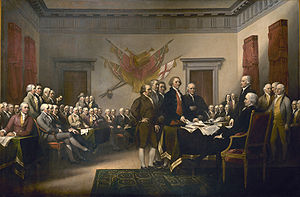- Second Congres continental
-
Second Congrès continental
 John Trumbull Declaration of Independence
John Trumbull Declaration of Independence
Le Second Congrès continental est le nom donner à l'assemblée de délégués des 13 colonies américaines qui siégea du 10 mai 1775 au 1er mars 1781. Il adopta la Déclaration d'indépendance américaine du 4 juillet 1776, ainsi que les Articles de la Confederation. Pendant la Révolution américaine, le Congrès fit office de gouvernement et prit des décisions concernant la politique étrangère, la guerre et la monnaie[1].
Sommaire
Histoire
Le Congrès se réunit à Philadelphie en Pennsylvanie le 10 mai 1775 à la Pennsylvania State House (aujourd'hui Independence Hall) ; Benjamin Franklin et George Washington y siégeaient alors comme délégués[2]. Le Second Congrès continental adresse un deuxième appel aux Canadiens pour qu'ils rejoignent les états américains dans leur contre l'Angleterre[3] (le premier appel avait été adressé en 1774, sans succès). Le 21 juillet 1775, le Congrès étudie une proposition de confédération élaborée par Benjamin Franklin : elle prévoit une constitution[4].
Suite à la défaite américaine de Brandywine le 11 septembre 1777, il doit s'enfuir d'abord à Lancaster (Pennsylvanie) puis à York (Pennsylvanie). Le matériel de guerre a lui aussi été déplacé vers Reading (Pennsylvanie). Les affrontements se sont poursuivient dans la région pendant une semaine. Après avoir investi Philadelphie en septembre 1777, les Britanniques concentrèrent 9 000 hommes à Germantown, située à 8 km au nord de Philadelphie.
Œuvre du Second Congrès continental
Le Second Congrès continental a gouverner les États-Unis de 1775 à 1781.
Il a créer :
- l'armée continentale (1775) ;
- la marine américaine ;
- un réseau postal (26 juillet 1775[réf. souhaitée]).
- ...
Il a adopter l'indépendance américaine (1776) et les Articles de la Confédération (1777). Il s'est occuper de la monnaie et a émit des emprunts.
Enfin, l'assemblée a négocier l'alliance avec la France (1778) eta mit en place un service diplomatique[5].
Liste des Présidents
- Samuel Huntington (1er mars 1781-9juillet 1781)
- Thomas McKean (10 juillet 1781-4 novembre 1781)
- John Hanson (5 novembre 1781-3 novembre 1782)
- Elias Boudinot (4 novembre 1782-2 novembre 1783)
- Thomas Mifflin (3 novembre 1783-31 octobre 1784)
- Richard Henry Lee (30 novembre 1784-6 novembre 1785)
- John Hancock (23 novembre 1785-29 mai 1786)
- Nathaniel Gorham (6 juin 1786-5 novembre 1786)
- Arthur St. Clair (2 février 1787-4 novembre 1787)
- Cyrus Griffin (22 janvier 1788-2 novembre 1788)
Voir aussi
Liens internes
Source
- (en) Cet article est partiellement ou en totalité issu d’une traduction de l’article de Wikipédia en anglais intitulé « Second Continental Congress ».
Notes
- ↑ Cogliano, Revolutionary America, 1763-1815 p. 113 ; Élise Marienstras, Naomi Wulf, Révoltes et révolutions en Amérique, Atlande, 2005, p.68
- ↑ Bernard Cottret, La Révolution américaine : La quête du bonheur 1763-1787, Paris, Perrin, 2003, (ISBN 2262018219), p.166
- ↑ Bernard Cottret, La Révolution américaine : La quête du bonheur 1763-1787, Paris, Perrin, 2003, (ISBN 2262018219), p.168
- ↑ Bernard Cottret, La Révolution américaine : La quête du bonheur 1763-1787, Paris, Perrin, 2003, (ISBN 2262018219), p.171
- ↑ Bernard Vincent, La Révolution américaine 1775-1783, Nancy, Presses Universitaires de Nancy, 1985, tome 2, (ISBN 2864802112), p.161
Bibliographie
- Adams, Willi Paul. The First American Constitutions: Republican Ideology and the Making of the State Constitutions in the Revolutionary Era. U. of North Carolina Press, 1980. 351 pp. ISBN 0742520692
- Bancroft, George. History of the United States of America, from the discovery of the American continent. (1854-78), vol 4-10 lire en ligne
- Edmund C. Burnett, The Continental Congress, 1941, 1975, Greenwood Publishing, ISBN 0-8371-8386-3
- Francis D. Cogliano, Revolutionary America, 1763-1815: A Political History. London: 2000. ISBN 0415180570
- Worthington C. Ford, et al. ed. Journals of the Continental Congress, 1774–1789. (34 vol., 1904–1937) lire en ligne
- H. James Henderson, Party Politics in the Continental Congress, 1974, 2002, Rowman & Littlefield, ISBN 0-8191-6525-5
- Peter Force, ed. American Archives 9 vol 1837-1853, major compilation of documents 1774-1776. online edition
- James J. Kirschke. Gouverneur Morris: Author, Statesman, and Man of the World (2005) ISBN 031224195X
- Kruman, Marc W. Between Authority and Liberty: State Constitution Making in Revolutionary America. U. of North Carolina Pr., 1997. ISBN 0807847976
- Maier, Pauline. American Scripture: Making the Declaration of Independence (1998)
- Miller, John C. Triumph of Freedom, 1775-1783 (1948) ISBN 0313207798
- Lynn Montross, The Reluctant Rebels; the Story of the Continental Congress, 1774–1789, 1950, 1970, Barnes & Noble, ISBN 0-389-03973-X
- Rakove, Jack N. The Beginnings of National Politics: An Interpretive History of the Continental Congress. Knopf, 1979. ISBN 0801828643
- Winton U. Solberg. The Federal Convention and the Formation of the Union of the American States. (Liberal Arts Press. 1958.)
Liens externes
- (en) Americans.net
- (en) Texte Journals of the Continental Congress, 1774–1789
- (en) Version flash du tableau de John Trumbull, Declaration of Independence
- Portail de la Révolution américaine
- Portail des États-Unis
Catégories : Histoire de Philadelphie | Révolution américaine
Wikimedia Foundation. 2010.
